Reflective Journal on Project Management and Leadership Skills
VerifiedAdded on 2022/08/16
|7
|2255
|21
Journal and Reflective Writing
AI Summary
This reflective journal explores key aspects of project management, focusing on leadership, teamwork, and conflict resolution within organizational settings. The student reflects on their learning experiences, highlighting the importance of skills such as negotiation, self-awareness, and motivation in managing projects effectively. The journal references theoretical models like Gibbs's reflective model and Kolb’s reflective cycle, and emphasizes the significance of the Project Management Body of Knowledge (PMBOK) in project success. It discusses the five phases of project management (initiation, planning, execution, control, and closure) and the impact of leadership on project outcomes. The author shares insights into conflict management, including strategies for resolving disputes and the role of reflection in professional development. The journal also touches on issues of diversity, communication, and the benefits of motivation in fostering a productive work environment. The author concludes by emphasizing the value of reflective practice in enhancing decision-making and personal growth within the field of project management, referencing various sources to support the concepts discussed.
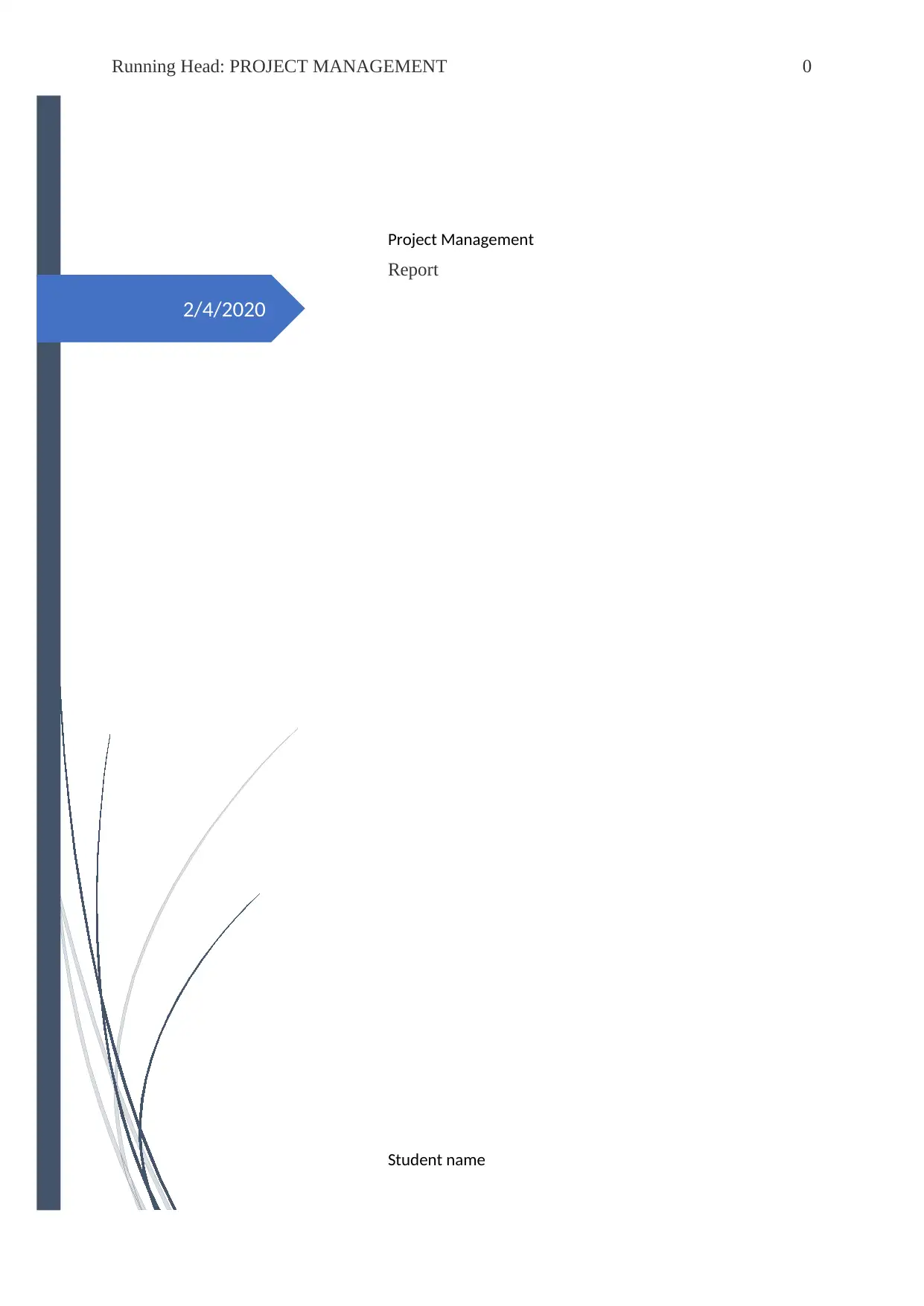
2/4/2020
Running Head: PROJECT MANAGEMENT 0
Project Management
Report
Student name
Running Head: PROJECT MANAGEMENT 0
Project Management
Report
Student name
Paraphrase This Document
Need a fresh take? Get an instant paraphrase of this document with our AI Paraphraser
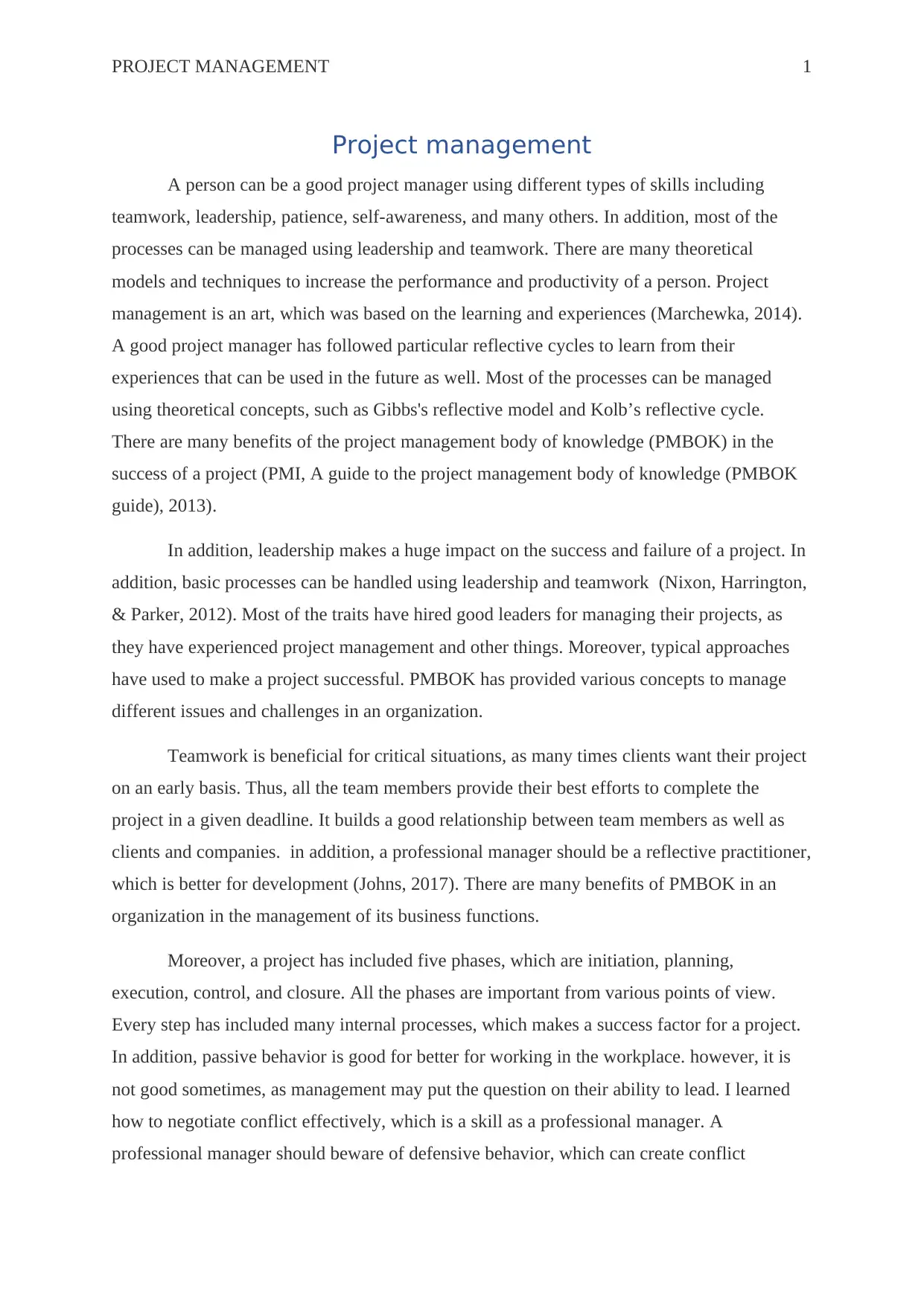
PROJECT MANAGEMENT 1
Project management
A person can be a good project manager using different types of skills including
teamwork, leadership, patience, self-awareness, and many others. In addition, most of the
processes can be managed using leadership and teamwork. There are many theoretical
models and techniques to increase the performance and productivity of a person. Project
management is an art, which was based on the learning and experiences (Marchewka, 2014).
A good project manager has followed particular reflective cycles to learn from their
experiences that can be used in the future as well. Most of the processes can be managed
using theoretical concepts, such as Gibbs's reflective model and Kolb’s reflective cycle.
There are many benefits of the project management body of knowledge (PMBOK) in the
success of a project (PMI, A guide to the project management body of knowledge (PMBOK
guide), 2013).
In addition, leadership makes a huge impact on the success and failure of a project. In
addition, basic processes can be handled using leadership and teamwork (Nixon, Harrington,
& Parker, 2012). Most of the traits have hired good leaders for managing their projects, as
they have experienced project management and other things. Moreover, typical approaches
have used to make a project successful. PMBOK has provided various concepts to manage
different issues and challenges in an organization.
Teamwork is beneficial for critical situations, as many times clients want their project
on an early basis. Thus, all the team members provide their best efforts to complete the
project in a given deadline. It builds a good relationship between team members as well as
clients and companies. in addition, a professional manager should be a reflective practitioner,
which is better for development (Johns, 2017). There are many benefits of PMBOK in an
organization in the management of its business functions.
Moreover, a project has included five phases, which are initiation, planning,
execution, control, and closure. All the phases are important from various points of view.
Every step has included many internal processes, which makes a success factor for a project.
In addition, passive behavior is good for better for working in the workplace. however, it is
not good sometimes, as management may put the question on their ability to lead. I learned
how to negotiate conflict effectively, which is a skill as a professional manager. A
professional manager should beware of defensive behavior, which can create conflict
Project management
A person can be a good project manager using different types of skills including
teamwork, leadership, patience, self-awareness, and many others. In addition, most of the
processes can be managed using leadership and teamwork. There are many theoretical
models and techniques to increase the performance and productivity of a person. Project
management is an art, which was based on the learning and experiences (Marchewka, 2014).
A good project manager has followed particular reflective cycles to learn from their
experiences that can be used in the future as well. Most of the processes can be managed
using theoretical concepts, such as Gibbs's reflective model and Kolb’s reflective cycle.
There are many benefits of the project management body of knowledge (PMBOK) in the
success of a project (PMI, A guide to the project management body of knowledge (PMBOK
guide), 2013).
In addition, leadership makes a huge impact on the success and failure of a project. In
addition, basic processes can be handled using leadership and teamwork (Nixon, Harrington,
& Parker, 2012). Most of the traits have hired good leaders for managing their projects, as
they have experienced project management and other things. Moreover, typical approaches
have used to make a project successful. PMBOK has provided various concepts to manage
different issues and challenges in an organization.
Teamwork is beneficial for critical situations, as many times clients want their project
on an early basis. Thus, all the team members provide their best efforts to complete the
project in a given deadline. It builds a good relationship between team members as well as
clients and companies. in addition, a professional manager should be a reflective practitioner,
which is better for development (Johns, 2017). There are many benefits of PMBOK in an
organization in the management of its business functions.
Moreover, a project has included five phases, which are initiation, planning,
execution, control, and closure. All the phases are important from various points of view.
Every step has included many internal processes, which makes a success factor for a project.
In addition, passive behavior is good for better for working in the workplace. however, it is
not good sometimes, as management may put the question on their ability to lead. I learned
how to negotiate conflict effectively, which is a skill as a professional manager. A
professional manager should beware of defensive behavior, which can create conflict
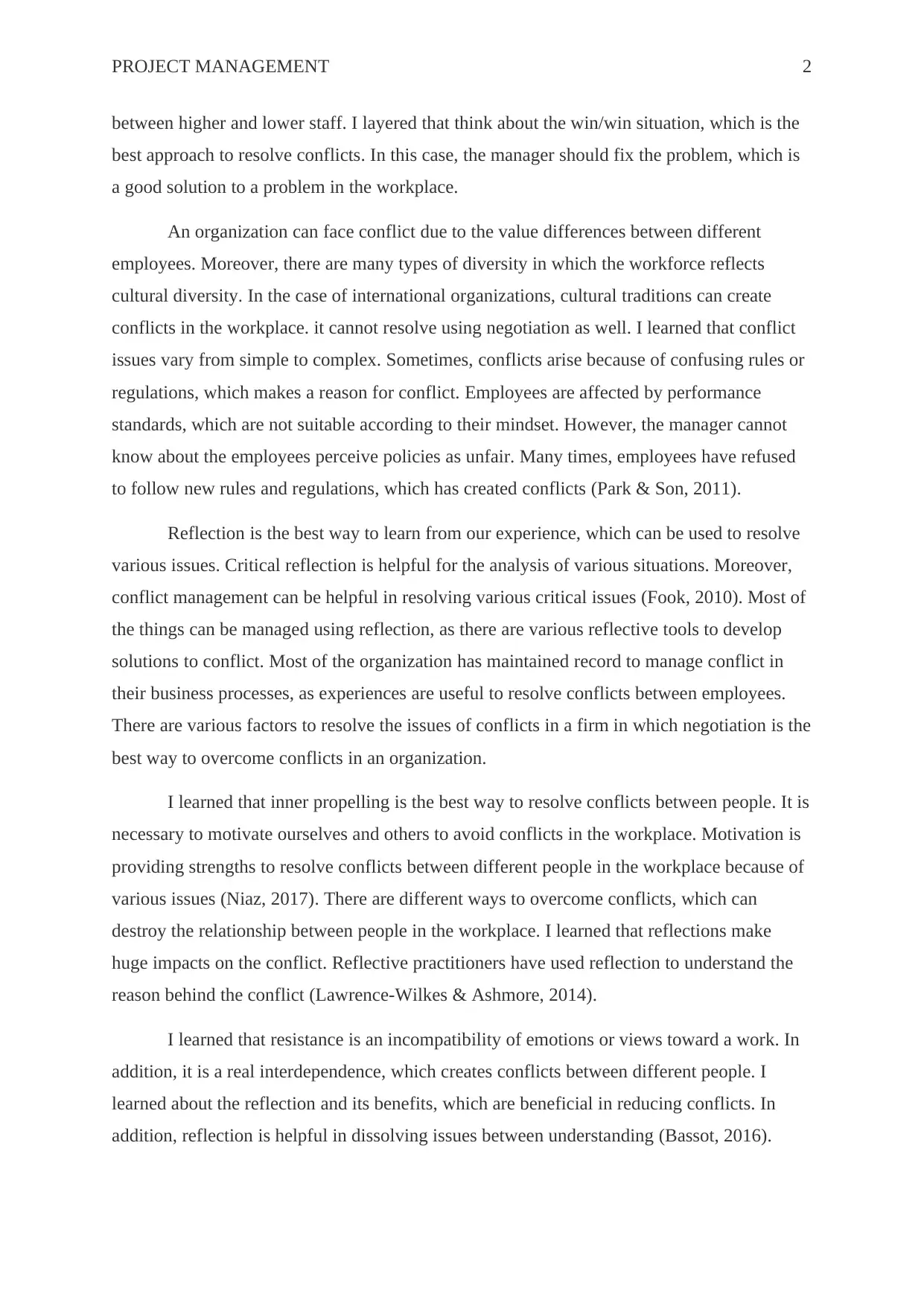
PROJECT MANAGEMENT 2
between higher and lower staff. I layered that think about the win/win situation, which is the
best approach to resolve conflicts. In this case, the manager should fix the problem, which is
a good solution to a problem in the workplace.
An organization can face conflict due to the value differences between different
employees. Moreover, there are many types of diversity in which the workforce reflects
cultural diversity. In the case of international organizations, cultural traditions can create
conflicts in the workplace. it cannot resolve using negotiation as well. I learned that conflict
issues vary from simple to complex. Sometimes, conflicts arise because of confusing rules or
regulations, which makes a reason for conflict. Employees are affected by performance
standards, which are not suitable according to their mindset. However, the manager cannot
know about the employees perceive policies as unfair. Many times, employees have refused
to follow new rules and regulations, which has created conflicts (Park & Son, 2011).
Reflection is the best way to learn from our experience, which can be used to resolve
various issues. Critical reflection is helpful for the analysis of various situations. Moreover,
conflict management can be helpful in resolving various critical issues (Fook, 2010). Most of
the things can be managed using reflection, as there are various reflective tools to develop
solutions to conflict. Most of the organization has maintained record to manage conflict in
their business processes, as experiences are useful to resolve conflicts between employees.
There are various factors to resolve the issues of conflicts in a firm in which negotiation is the
best way to overcome conflicts in an organization.
I learned that inner propelling is the best way to resolve conflicts between people. It is
necessary to motivate ourselves and others to avoid conflicts in the workplace. Motivation is
providing strengths to resolve conflicts between different people in the workplace because of
various issues (Niaz, 2017). There are different ways to overcome conflicts, which can
destroy the relationship between people in the workplace. I learned that reflections make
huge impacts on the conflict. Reflective practitioners have used reflection to understand the
reason behind the conflict (Lawrence-Wilkes & Ashmore, 2014).
I learned that resistance is an incompatibility of emotions or views toward a work. In
addition, it is a real interdependence, which creates conflicts between different people. I
learned about the reflection and its benefits, which are beneficial in reducing conflicts. In
addition, reflection is helpful in dissolving issues between understanding (Bassot, 2016).
between higher and lower staff. I layered that think about the win/win situation, which is the
best approach to resolve conflicts. In this case, the manager should fix the problem, which is
a good solution to a problem in the workplace.
An organization can face conflict due to the value differences between different
employees. Moreover, there are many types of diversity in which the workforce reflects
cultural diversity. In the case of international organizations, cultural traditions can create
conflicts in the workplace. it cannot resolve using negotiation as well. I learned that conflict
issues vary from simple to complex. Sometimes, conflicts arise because of confusing rules or
regulations, which makes a reason for conflict. Employees are affected by performance
standards, which are not suitable according to their mindset. However, the manager cannot
know about the employees perceive policies as unfair. Many times, employees have refused
to follow new rules and regulations, which has created conflicts (Park & Son, 2011).
Reflection is the best way to learn from our experience, which can be used to resolve
various issues. Critical reflection is helpful for the analysis of various situations. Moreover,
conflict management can be helpful in resolving various critical issues (Fook, 2010). Most of
the things can be managed using reflection, as there are various reflective tools to develop
solutions to conflict. Most of the organization has maintained record to manage conflict in
their business processes, as experiences are useful to resolve conflicts between employees.
There are various factors to resolve the issues of conflicts in a firm in which negotiation is the
best way to overcome conflicts in an organization.
I learned that inner propelling is the best way to resolve conflicts between people. It is
necessary to motivate ourselves and others to avoid conflicts in the workplace. Motivation is
providing strengths to resolve conflicts between different people in the workplace because of
various issues (Niaz, 2017). There are different ways to overcome conflicts, which can
destroy the relationship between people in the workplace. I learned that reflections make
huge impacts on the conflict. Reflective practitioners have used reflection to understand the
reason behind the conflict (Lawrence-Wilkes & Ashmore, 2014).
I learned that resistance is an incompatibility of emotions or views toward a work. In
addition, it is a real interdependence, which creates conflicts between different people. I
learned about the reflection and its benefits, which are beneficial in reducing conflicts. In
addition, reflection is helpful in dissolving issues between understanding (Bassot, 2016).
⊘ This is a preview!⊘
Do you want full access?
Subscribe today to unlock all pages.

Trusted by 1+ million students worldwide
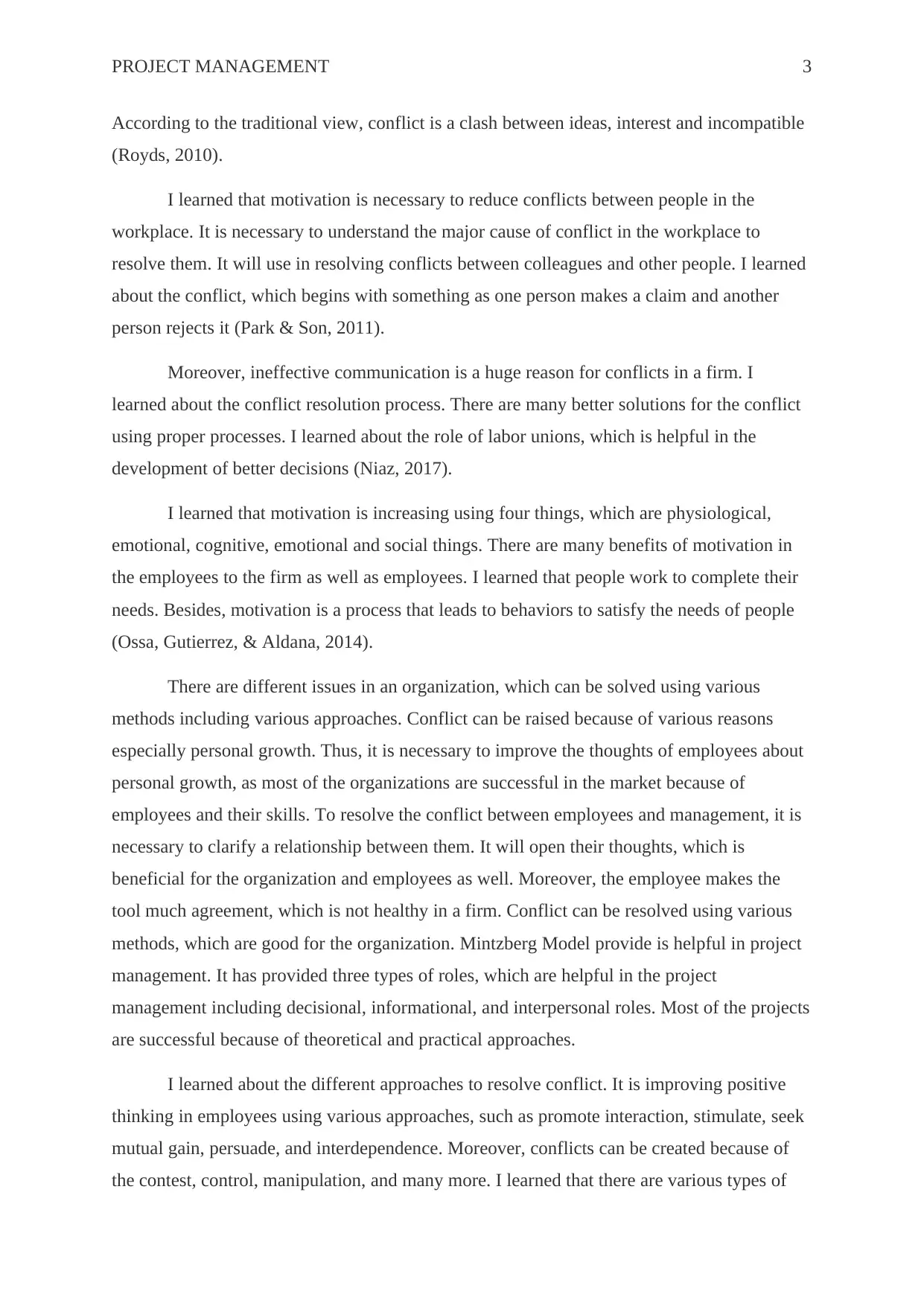
PROJECT MANAGEMENT 3
According to the traditional view, conflict is a clash between ideas, interest and incompatible
(Royds, 2010).
I learned that motivation is necessary to reduce conflicts between people in the
workplace. It is necessary to understand the major cause of conflict in the workplace to
resolve them. It will use in resolving conflicts between colleagues and other people. I learned
about the conflict, which begins with something as one person makes a claim and another
person rejects it (Park & Son, 2011).
Moreover, ineffective communication is a huge reason for conflicts in a firm. I
learned about the conflict resolution process. There are many better solutions for the conflict
using proper processes. I learned about the role of labor unions, which is helpful in the
development of better decisions (Niaz, 2017).
I learned that motivation is increasing using four things, which are physiological,
emotional, cognitive, emotional and social things. There are many benefits of motivation in
the employees to the firm as well as employees. I learned that people work to complete their
needs. Besides, motivation is a process that leads to behaviors to satisfy the needs of people
(Ossa, Gutierrez, & Aldana, 2014).
There are different issues in an organization, which can be solved using various
methods including various approaches. Conflict can be raised because of various reasons
especially personal growth. Thus, it is necessary to improve the thoughts of employees about
personal growth, as most of the organizations are successful in the market because of
employees and their skills. To resolve the conflict between employees and management, it is
necessary to clarify a relationship between them. It will open their thoughts, which is
beneficial for the organization and employees as well. Moreover, the employee makes the
tool much agreement, which is not healthy in a firm. Conflict can be resolved using various
methods, which are good for the organization. Mintzberg Model provide is helpful in project
management. It has provided three types of roles, which are helpful in the project
management including decisional, informational, and interpersonal roles. Most of the projects
are successful because of theoretical and practical approaches.
I learned about the different approaches to resolve conflict. It is improving positive
thinking in employees using various approaches, such as promote interaction, stimulate, seek
mutual gain, persuade, and interdependence. Moreover, conflicts can be created because of
the contest, control, manipulation, and many more. I learned that there are various types of
According to the traditional view, conflict is a clash between ideas, interest and incompatible
(Royds, 2010).
I learned that motivation is necessary to reduce conflicts between people in the
workplace. It is necessary to understand the major cause of conflict in the workplace to
resolve them. It will use in resolving conflicts between colleagues and other people. I learned
about the conflict, which begins with something as one person makes a claim and another
person rejects it (Park & Son, 2011).
Moreover, ineffective communication is a huge reason for conflicts in a firm. I
learned about the conflict resolution process. There are many better solutions for the conflict
using proper processes. I learned about the role of labor unions, which is helpful in the
development of better decisions (Niaz, 2017).
I learned that motivation is increasing using four things, which are physiological,
emotional, cognitive, emotional and social things. There are many benefits of motivation in
the employees to the firm as well as employees. I learned that people work to complete their
needs. Besides, motivation is a process that leads to behaviors to satisfy the needs of people
(Ossa, Gutierrez, & Aldana, 2014).
There are different issues in an organization, which can be solved using various
methods including various approaches. Conflict can be raised because of various reasons
especially personal growth. Thus, it is necessary to improve the thoughts of employees about
personal growth, as most of the organizations are successful in the market because of
employees and their skills. To resolve the conflict between employees and management, it is
necessary to clarify a relationship between them. It will open their thoughts, which is
beneficial for the organization and employees as well. Moreover, the employee makes the
tool much agreement, which is not healthy in a firm. Conflict can be resolved using various
methods, which are good for the organization. Mintzberg Model provide is helpful in project
management. It has provided three types of roles, which are helpful in the project
management including decisional, informational, and interpersonal roles. Most of the projects
are successful because of theoretical and practical approaches.
I learned about the different approaches to resolve conflict. It is improving positive
thinking in employees using various approaches, such as promote interaction, stimulate, seek
mutual gain, persuade, and interdependence. Moreover, conflicts can be created because of
the contest, control, manipulation, and many more. I learned that there are various types of
Paraphrase This Document
Need a fresh take? Get an instant paraphrase of this document with our AI Paraphraser
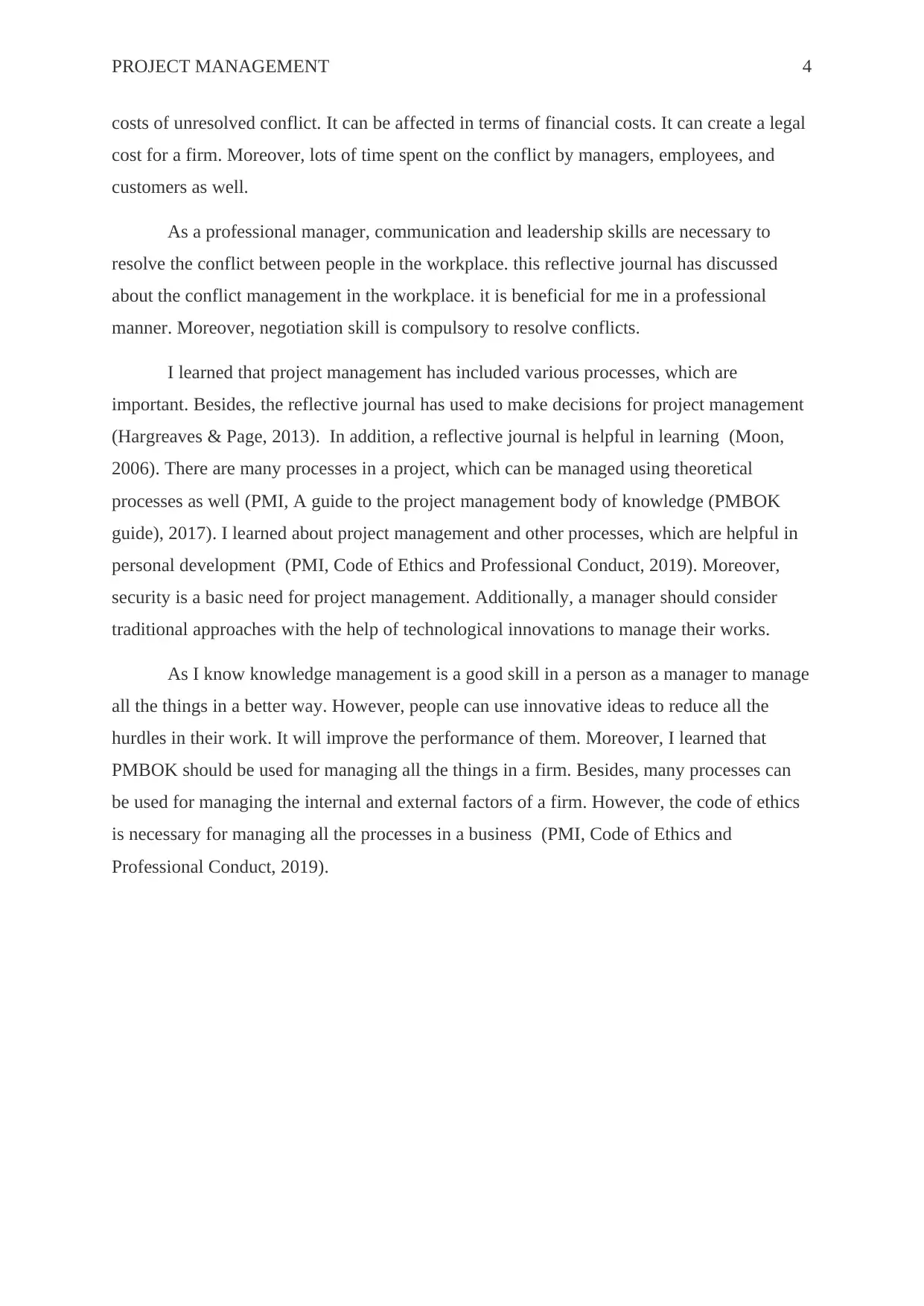
PROJECT MANAGEMENT 4
costs of unresolved conflict. It can be affected in terms of financial costs. It can create a legal
cost for a firm. Moreover, lots of time spent on the conflict by managers, employees, and
customers as well.
As a professional manager, communication and leadership skills are necessary to
resolve the conflict between people in the workplace. this reflective journal has discussed
about the conflict management in the workplace. it is beneficial for me in a professional
manner. Moreover, negotiation skill is compulsory to resolve conflicts.
I learned that project management has included various processes, which are
important. Besides, the reflective journal has used to make decisions for project management
(Hargreaves & Page, 2013). In addition, a reflective journal is helpful in learning (Moon,
2006). There are many processes in a project, which can be managed using theoretical
processes as well (PMI, A guide to the project management body of knowledge (PMBOK
guide), 2017). I learned about project management and other processes, which are helpful in
personal development (PMI, Code of Ethics and Professional Conduct, 2019). Moreover,
security is a basic need for project management. Additionally, a manager should consider
traditional approaches with the help of technological innovations to manage their works.
As I know knowledge management is a good skill in a person as a manager to manage
all the things in a better way. However, people can use innovative ideas to reduce all the
hurdles in their work. It will improve the performance of them. Moreover, I learned that
PMBOK should be used for managing all the things in a firm. Besides, many processes can
be used for managing the internal and external factors of a firm. However, the code of ethics
is necessary for managing all the processes in a business (PMI, Code of Ethics and
Professional Conduct, 2019).
costs of unresolved conflict. It can be affected in terms of financial costs. It can create a legal
cost for a firm. Moreover, lots of time spent on the conflict by managers, employees, and
customers as well.
As a professional manager, communication and leadership skills are necessary to
resolve the conflict between people in the workplace. this reflective journal has discussed
about the conflict management in the workplace. it is beneficial for me in a professional
manner. Moreover, negotiation skill is compulsory to resolve conflicts.
I learned that project management has included various processes, which are
important. Besides, the reflective journal has used to make decisions for project management
(Hargreaves & Page, 2013). In addition, a reflective journal is helpful in learning (Moon,
2006). There are many processes in a project, which can be managed using theoretical
processes as well (PMI, A guide to the project management body of knowledge (PMBOK
guide), 2017). I learned about project management and other processes, which are helpful in
personal development (PMI, Code of Ethics and Professional Conduct, 2019). Moreover,
security is a basic need for project management. Additionally, a manager should consider
traditional approaches with the help of technological innovations to manage their works.
As I know knowledge management is a good skill in a person as a manager to manage
all the things in a better way. However, people can use innovative ideas to reduce all the
hurdles in their work. It will improve the performance of them. Moreover, I learned that
PMBOK should be used for managing all the things in a firm. Besides, many processes can
be used for managing the internal and external factors of a firm. However, the code of ethics
is necessary for managing all the processes in a business (PMI, Code of Ethics and
Professional Conduct, 2019).
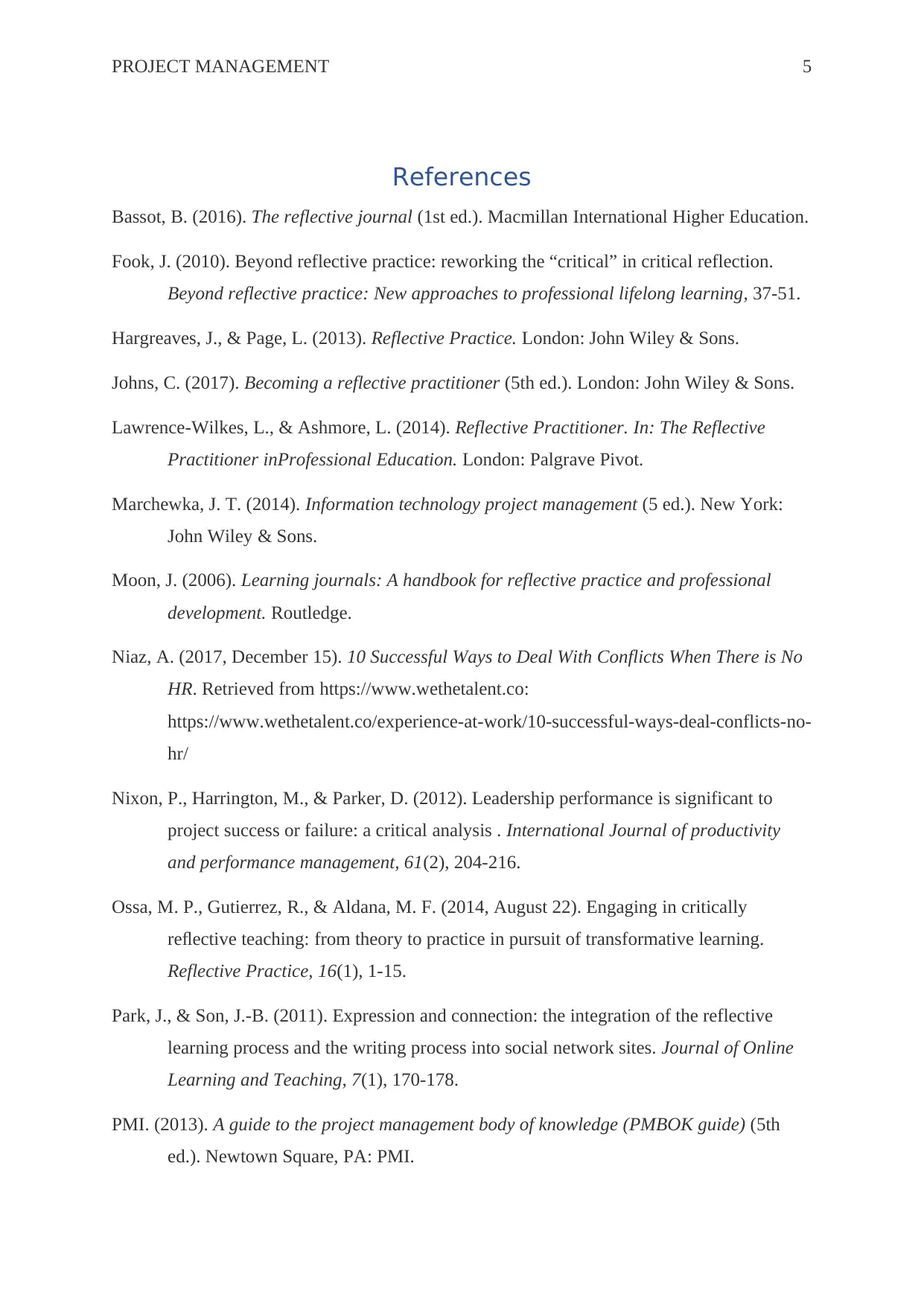
PROJECT MANAGEMENT 5
References
Bassot, B. (2016). The reflective journal (1st ed.). Macmillan International Higher Education.
Fook, J. (2010). Beyond reflective practice: reworking the “critical” in critical reflection.
Beyond reflective practice: New approaches to professional lifelong learning, 37-51.
Hargreaves, J., & Page, L. (2013). Reflective Practice. London: John Wiley & Sons.
Johns, C. (2017). Becoming a reflective practitioner (5th ed.). London: John Wiley & Sons.
Lawrence-Wilkes, L., & Ashmore, L. (2014). Reflective Practitioner. In: The Reflective
Practitioner inProfessional Education. London: Palgrave Pivot.
Marchewka, J. T. (2014). Information technology project management (5 ed.). New York:
John Wiley & Sons.
Moon, J. (2006). Learning journals: A handbook for reflective practice and professional
development. Routledge.
Niaz, A. (2017, December 15). 10 Successful Ways to Deal With Conflicts When There is No
HR. Retrieved from https://www.wethetalent.co:
https://www.wethetalent.co/experience-at-work/10-successful-ways-deal-conflicts-no-
hr/
Nixon, P., Harrington, M., & Parker, D. (2012). Leadership performance is significant to
project success or failure: a critical analysis . International Journal of productivity
and performance management, 61(2), 204-216.
Ossa, M. P., Gutierrez, R., & Aldana, M. F. (2014, August 22). Engaging in critically
reflective teaching: from theory to practice in pursuit of transformative learning.
Reflective Practice, 16(1), 1-15.
Park, J., & Son, J.-B. (2011). Expression and connection: the integration of the reflective
learning process and the writing process into social network sites. Journal of Online
Learning and Teaching, 7(1), 170-178.
PMI. (2013). A guide to the project management body of knowledge (PMBOK guide) (5th
ed.). Newtown Square, PA: PMI.
References
Bassot, B. (2016). The reflective journal (1st ed.). Macmillan International Higher Education.
Fook, J. (2010). Beyond reflective practice: reworking the “critical” in critical reflection.
Beyond reflective practice: New approaches to professional lifelong learning, 37-51.
Hargreaves, J., & Page, L. (2013). Reflective Practice. London: John Wiley & Sons.
Johns, C. (2017). Becoming a reflective practitioner (5th ed.). London: John Wiley & Sons.
Lawrence-Wilkes, L., & Ashmore, L. (2014). Reflective Practitioner. In: The Reflective
Practitioner inProfessional Education. London: Palgrave Pivot.
Marchewka, J. T. (2014). Information technology project management (5 ed.). New York:
John Wiley & Sons.
Moon, J. (2006). Learning journals: A handbook for reflective practice and professional
development. Routledge.
Niaz, A. (2017, December 15). 10 Successful Ways to Deal With Conflicts When There is No
HR. Retrieved from https://www.wethetalent.co:
https://www.wethetalent.co/experience-at-work/10-successful-ways-deal-conflicts-no-
hr/
Nixon, P., Harrington, M., & Parker, D. (2012). Leadership performance is significant to
project success or failure: a critical analysis . International Journal of productivity
and performance management, 61(2), 204-216.
Ossa, M. P., Gutierrez, R., & Aldana, M. F. (2014, August 22). Engaging in critically
reflective teaching: from theory to practice in pursuit of transformative learning.
Reflective Practice, 16(1), 1-15.
Park, J., & Son, J.-B. (2011). Expression and connection: the integration of the reflective
learning process and the writing process into social network sites. Journal of Online
Learning and Teaching, 7(1), 170-178.
PMI. (2013). A guide to the project management body of knowledge (PMBOK guide) (5th
ed.). Newtown Square, PA: PMI.
⊘ This is a preview!⊘
Do you want full access?
Subscribe today to unlock all pages.

Trusted by 1+ million students worldwide
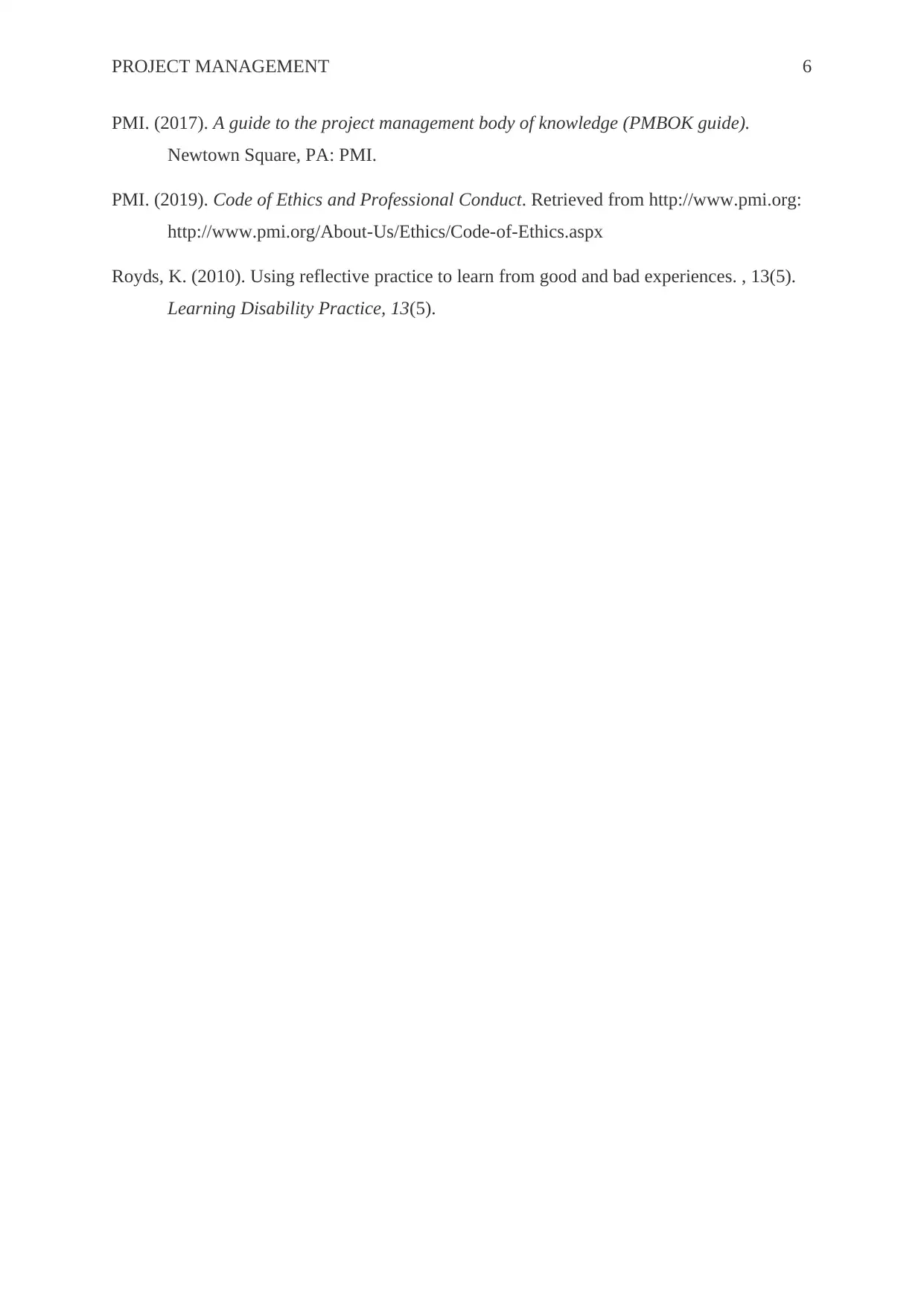
PROJECT MANAGEMENT 6
PMI. (2017). A guide to the project management body of knowledge (PMBOK guide).
Newtown Square, PA: PMI.
PMI. (2019). Code of Ethics and Professional Conduct. Retrieved from http://www.pmi.org:
http://www.pmi.org/About-Us/Ethics/Code-of-Ethics.aspx
Royds, K. (2010). Using reflective practice to learn from good and bad experiences. , 13(5).
Learning Disability Practice, 13(5).
PMI. (2017). A guide to the project management body of knowledge (PMBOK guide).
Newtown Square, PA: PMI.
PMI. (2019). Code of Ethics and Professional Conduct. Retrieved from http://www.pmi.org:
http://www.pmi.org/About-Us/Ethics/Code-of-Ethics.aspx
Royds, K. (2010). Using reflective practice to learn from good and bad experiences. , 13(5).
Learning Disability Practice, 13(5).
1 out of 7
Related Documents
Your All-in-One AI-Powered Toolkit for Academic Success.
+13062052269
info@desklib.com
Available 24*7 on WhatsApp / Email
![[object Object]](/_next/static/media/star-bottom.7253800d.svg)
Unlock your academic potential
Copyright © 2020–2025 A2Z Services. All Rights Reserved. Developed and managed by ZUCOL.





